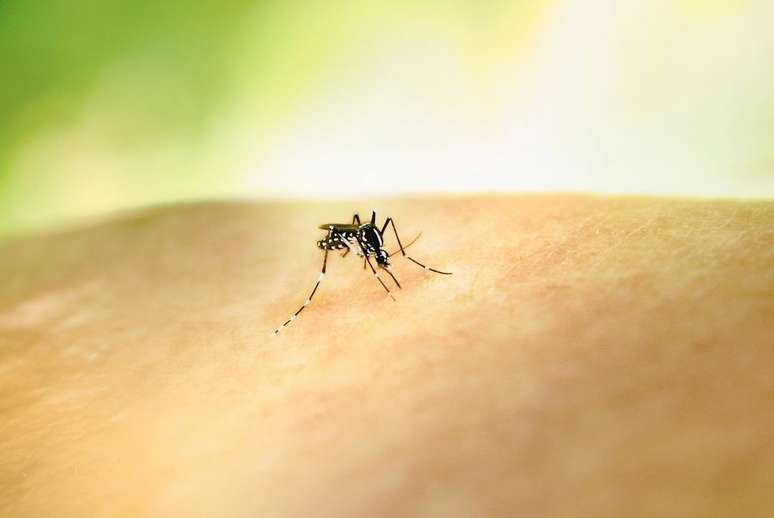Experts explain how to use the repellent safely, avoiding reactions and allergies. The formula against dengue mosquitoes must be registered with Anvisa
As dengue cases rise across the country, more and more people are using repellents to avoid mosquito bites Aedes aegizi. These formulas are safe, remove the carrier and do not harm your health, but you need to be careful when using them. In excess, they cause allergic reactions and other problems.
- How to protect yourself from dengue until the vaccine arrives?
- Discover 3 plants capable of repelling the dengue mosquito
To avoid any health problems related to the frequent use of insect repellents, the golden rule is to pay attention to the instructions on the information leaflet. There are the main recommendations, including how to use and against whom the repellent can be used the dengue mosquito.
How to choose the right repellent?
“There are several substances that can be used as repellents. Some last longer, others can be used on pregnant women, others some even repel ticks“, says Gislaine Ricci Leonardi, professor at the Faculty of Pharmaceutical Sciences of Unicamp, for the Canaltech.
In the specific case of dengue fever, there are three types of substances capable of repelling mosquitoes, with proven effectiveness:
- Icaridin;
- DEET (N-Diethyl-m-toluamide);
- IR3535.
In this regard, it is important to remember that repellents to be applied to the skin, in the form of spray, oil or cream, must be registered with the National Health Surveillance Agency (Anvisa). They are included in Cosmetics and available directly on the agency website.
Therefore “the ideal is to purchase repellent products registered with Anvisa, because it is this registration that guarantees that their application is effective and safe”, recommends Leonardi.
Among the options, it is always worth favoring dermatologically tested formulas and avoiding products that contain parabens, phthalates or alcohol in their composition.
What about natural formulas?
To prevent mosquito bites, natural recipes and formulas are widely shared on social media, which may include citronella oil, clove oil, clove oil, or even andiroba oil. However, these products are not registered with Anvisa and their effectiveness is not guaranteed.
Be careful with child repellent
The use of repellents on children deserves special attention, as the risk of health problems, allergies and irritation is greater. In general, baby repellent is not recommended for anyone under 2 years old. When indicated, some repellents with IR3535 can be used on children older than 6 months.
In children aged 2 to 12 years the most recommended use is the repellent with DEET, as long as its concentration does not exceed 10%. From the age of 13, conventional repellents can already be used.
“Some studies and scientific research suggest that, for pregnant women, DEET-based repellents, the best-selling on the market, are the safest,” says Theodoro Habermann Neto, dermatologist at Vera Cruz Hospital.
How to use mosquito repellent?
The repellent should only be applied to areas of the body potentially exposed to the dengue mosquito. This way it is not necessary to protect the parts covered by clothing. On average, the insect protection area is limited to 4 cm from the point of application of the product.

For children, the ideal is not to apply insect repellent on the palms of the hands, because the little one could put the product in his mouth. For adults it is necessary to wash your hands after application.
Can you apply the repellent again?
Each dengue repellent formula has a shelf life, described in the leaflet. Later in the day, you may need to reapply the product.
When a person bathes, showers, engages in strenuous physical activity, or sweats excessively, it is necessary to reapply the protective barrier that keeps the dengue mosquito away.
On average, the recommendation is to apply the repellent a maximum of three times a day. “Since the average duration of the repellent on the skin is 10 hours, three times is enough. This applies to both adults and children,” explains dermatologist Theodoro.
Is repellent bad for your health?
For most people who follow all these recommendations, insect repellents are not harmful to their health. However, in some individuals, these chemicals can still cause reactions, such as:
- Itching, redness and skin allergies;
- Cough;
- Sneezing;
- Heachache;
- Allergic attacks, especially in people with respiratory problems, such as asthma.
To reduce the risk of side effects, care should be taken during application and excessive use should be avoided. Typically, children are most affected by these problems.
Therefore, when possible, the best way to keep dengue mosquitoes out of the reach of children is “the use of plug-in repellents, taking care to maintain a distance of at least 2 m from the device with the product”, advises the dermatologist Theodore.
Is it worth using a sleep repellent?
The ideal is not to put repellents on your skin before going to bed, as there are other forms of protection, such as mosquito nets on windows, socket repellents or even the use of air conditioning.
Now, “if it is not possible to control or avoid mosquitoes’ access to the sleeping area, it is better to use it in exposed areas”, says Professor Leonardi, as long as the instructions on the package are followed, since each active ingredient has its own characteristics , particularities and restrictions.
Trends on Canaltech:
- Xiaomi lists the first phones that will receive HyperOS
- The new version of the Ultimates is the “dream team” of the Avengers
- Uber Teen mode will be released throughout Brazil
- MWC 2024 | Nubia Flip 5G is the cheapest foldable phone in the world
- Dell launches the new XPS 16 in Brazil at an exceptional price
- Xiaomi launches the CW500 security camera with low price and rain protection
Source: Terra
Rose James is a Gossipify movie and series reviewer known for her in-depth analysis and unique perspective on the latest releases. With a background in film studies, she provides engaging and informative reviews, and keeps readers up to date with industry trends and emerging talents.







